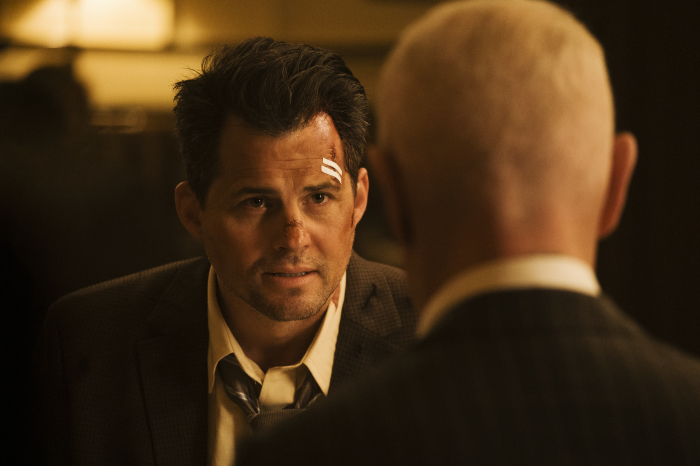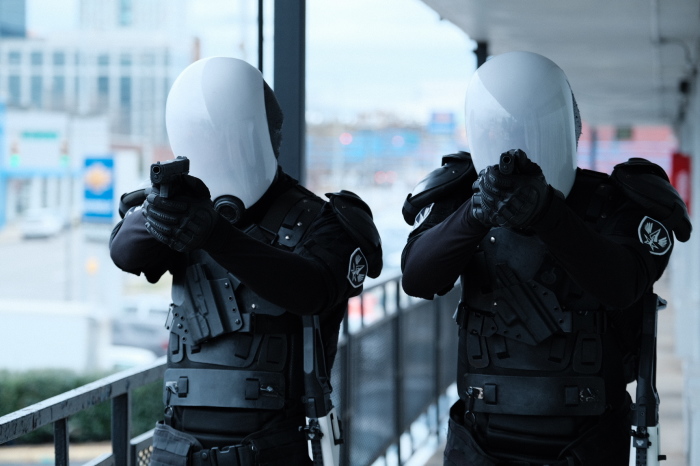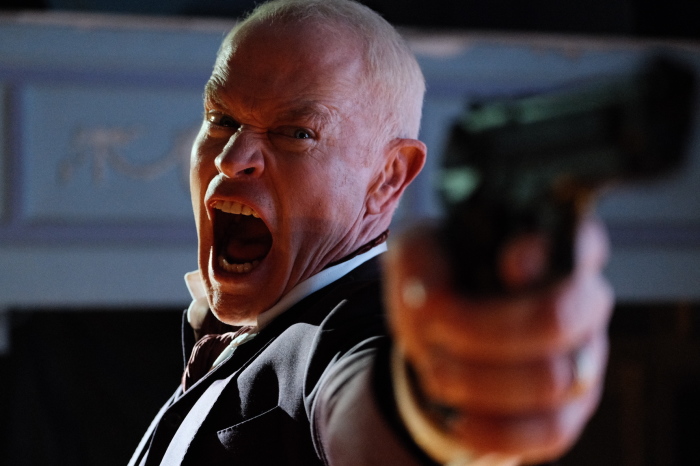Review: Ambitious 'The Shift' poses big questions about God's sovereignty, human suffering
Action-packed Christian sci-fi thriller aims at 'Inception' with the story of Job

From "Spiderman" to "Dr. Strange" to the world of "Lego," the multiverse is seemingly everywhere — at least in the entertainment world.
And while the premise of parallel realities and alternate worlds is anything but novel at this point, most Christians probably have at least considered what, if anything, the Bible says about whether even such a notion as a multiverse is possible.
Although not explicitly concerned with that question, “The Shift,” an ambitious if not wholly original Christian sci-fi thriller that debuted in theaters this month doesn’t shy away from the question of sin and human suffering in the context of a theoretical multi-dimensional reality.
"Shift" stars Neal McDonough as “The Benefactor,” a Luciferian figure who can whisk people from one interdimensional plane to another, and Kristoffer Polaha, who plays Kevin Garner, the hero who falls in love with his future wife Molly (played by Elizabeth Tabish of “The Chosen”) only to see that reality destroyed after he meets the Benefactor.
Sean Astin (“Stranger Things,” “The Lord of the Rings”) plays Gabriel, a friend of Kevin’s who, in Judas-like fashion, finally betrays him into the hands of the Benefactor.
When Kevin and Molly inexplicably lose their only child and, ultimately, their marriage, Kevin embarks on a search for his son that spans across the multiverse and runs afoul of the Benefactor, who banishes Kevin to a dystopian reality in which residents live under the watchful eye of armed stormtroopers in an urban slum world where Scripture is outlawed.
It’s clear that whatever its sci-fi aspirations, “The Shift” is first and foremost a cinematic meditation on suffering against the backdrop of parallel realities, which, outside the minds of Hollywood writers, might not actually exist.
You can almost hear the Hollywood pitch meeting: “It’s ‘Inception’ meets the story of Job.”
And much like that pitch, there is a lot to like about “The Shift” itself.
Indeed, the film’s press kit calls “The Shift” a modern-day retelling of the book of Job, and the movie quotes directly from Job at least twice.
As Kevin loses everything and finds himself living hand-to-mouth in a bleak and dying world, one in which he must search to find the love of his life in the face of utter despair, the viewer is undoubtedly reminded of the biblical story of Job.
What has made the book of Job so compelling for thousands of years is the grief and suffering through which Job not only comes to understand the sovereignty and holiness of God, but also His faithfulness demonstrated through suffering and His authority over all things, even death and Satan, the "accuser of the brethren" himself.
Kevin experiences a similar — though not identical — spiritual journey as Job, in that through prayer and trusting God in the face of so much suffering, Kevin becomes less focused on his own trials and deficiencies and losses and turns his heart outward to those around him who are facing even greater challenges.

Writer-director Brock Heasley’s dystopian version of the future, one in which cable news delivers the latest updates on the Benefactor’s words and deeds, including the “good news that, at long last, the Benefactor has returned,” is easily the most compelling backdrop in the film.
Watching a future that feels eerily not-so-distant from today’s headlines strikes an uneven chord with the drawn-out, slow-moving “romance” scenes that feel more like cable TV fodder, particularly in a Christian sci-fi movie.
While the Benefactor is clearly intended to represent Lucifer, he’s portrayed as nearly all-powerful, at times even manipulating time and space, when, in the book of Job at least, we see the devil asking God’s permission to harm Job and his family.
That biblical sense of chain-of-command is lost in “Shift,” where the Benefactor is instead portrayed as the apparent overlord of the world system who does as he wishes.
That said, it’s only in the handful of scenes in which the Benefactor, standing in for all the doubters and haters of God who have ever lived, calls into question the character of God that “Shift” finds its true voice.
McDonough, whom audiences will likely recognize from his roles in “Yellowstone” and films such as "Band of Brothers," "Minority Report" and others, clearly relished the opportunity to “humanize” the devil and does so with both aplomb and restraint, allowing the volume of his performance to ebb and flow with the storyline itself.
In one scene where Kevin calls the Benefactor a "liar," his response is one that surely resonates with all those who not only call themselves atheists, but even those who have, at one time or another, wondered why God didn’t show up.

"Do you want to know who the liar is? Do you want to know?” the Benefactor asks. “He's the liar. He lies to you when He says there's hope and goodness in this world. He lies to you when He says He loves, He forgives, He cares.
“If He cares so much, then why am I allowed to do these things to you? ... If He really loves us, why doesn't He stop me?”
At one of Kevin’s lowest points, the Benefactor asks him, "How many tests do you have to pass?"
It doesn’t matter where you are in your spiritual life. These aren’t merely rhetorical questions being asked in a scene in some Christian movie. These are some of the deepest questions we have as both the people of God and non-believers.
“The Shift” doesn’t attempt to provide any pat answers — and rightly so — but instead offers a glimpse into how those of us who have the mind of Christ see things through a much different lens.
Near the climax of the film, when Kevin decides to save a young woman who has been separated from her family over saving himself, the Benefactor mocks him for his self-sacrifice.
Watching this scene, one can’t help but hear the words hurled at Jesus as He was enduring the final moments of the Cross: “He saved others,” they said, “but he can’t save himself!” (Mark 15:31-32)
In the end, Kevin makes the Christlike decision to sacrifice his own future for the young woman's benefit, telling the Benefactor, “You're right. There is so much evil and horror and betrayal and inhumanity in this world ...
“But even in this world, and even in me, there is also goodness and kindness and so much beauty and hope. God is here. And in everything that I have ever witnessed and everything that I have done and everything that you have put me through just makes Him that much easier to see."
Is this the most theologically accurate statement ever said in a Christian movie? Probably not.
Does it speak to the problem of evil and the heart of the Christian worldview, which essentially says that God has allowed sin to reign for the time being before He ultimately destroys it for His glory and His Kingdom forever?
Absolutely.
Yes, the film is a tad derivative, amateurish at times and probably about a half-hour too long.
But with a compelling story of faith in the face of evil, an evangelistic emphasis on prayer over fear and a clear-eyed vision of the depravity of man, “The Shift” ultimately points viewers away from themselves and toward the truth of the Scriptures and of the only One who is neither bound by time, space, or even man’s fanciful notions of parallel universes.
Now, that's a conversation to take to your Christmas dinner table.
Angel Studios’ “The Shift” debuted in theaters on Dec. 1. The film has a running time of 115 minutes and is rated PG-13 for violence and thematic elements.
Ian M. Giatti is a reporter for The Christian Post and the author of BACKWARDS DAD: a children's book for grownups. He can be reached at: [email protected].




























